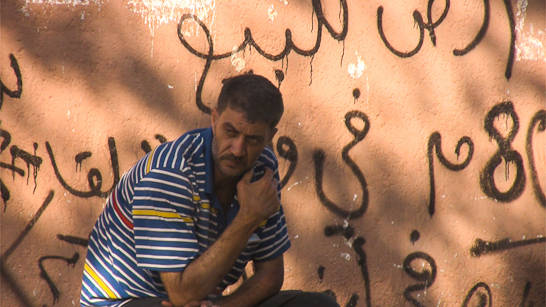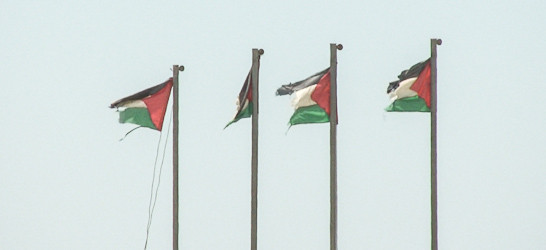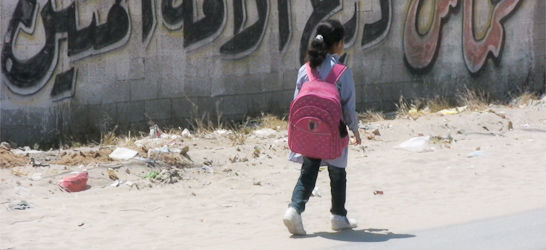Resistance is a Luxury – A Meditation

Under military occupation, continuing your life, trying to put up with hardship, bringing up your kids or earning for your family, is a struggle. Palestinians simply live their lives, as a means of resistance. This is resistance through the philosophised message of: Israel, you cannot change our way of life.
Gaza is not a rich place, and so for most people, maintaining a normal life is time-consuming. Having anything more than a humble and simple, normal life would be a luxurious impossibility.
When I leave Gaza City and visit other areas of the Strip, my eyes are flooded with Palestinians who continue their life; they live to resist. They resist by living. They refuse to let their life’s dignity be compromised. They find beauty and normalcy in their life.
The humble and simple life is diametrically different to the life of proactive resistance.
Proactive resistance is a luxury. It takes time and resources to be an activist, to resist Occupation with demonstrations, online advocacy and other forms of non-violent resistance.
So in Gaza, activists comprise of the most privileged of the society. Gaza is a strikingly economically unequal place, it seems.
I think what Islam does for the Palestinian people is to help render more placid people’s hearts, to help strengthen adherents to better deal with the world’s material strains and the Occupation’s stresses. Palestinians exemplify steadfastness, which they call ‘sumud’.
This, combined with the national cultural principle of ‘we will continue to live our lives’, provides a specially potent recipe for a beautiful and unique form of life as resistance.

I would cautiously add that this placidity extends to a national level, to affect the way Palestinians are received by the Western world; that is, generally received as the strange, Islamic ‘other’, people who don’t communicate and complain like ‘us’.
Since I’ve arrived in Gaza, I’ve heard many Palestinians complain about their people’s general ability to have good public relations skills, so as to help promote their cause abroad. Personally, I would explain any such weakness as a symptom of decades of illegal Occupation. But either way, there indeed appears to be a structural weakness in international public relations; at least in comparison to Israel’s comparatively successful PR status.
Israel, in my experience, does not conform to this sort of national principle of ‘let us continue life placidly’.
Rather, Israel exemplifies, in its political and diplomatic aural performance, a form of loud hysteria and nihilism. This characteristic helps explain the hysteria over the capture and detention of Gilad Shalit – that is, the one Israeli soldier who was captured by Palestinians, and was later released. The Israeli state’s reaction to the capture of this one trained killer was to produce enough outrage, noise and hysteria as to make Gilad Shalit practically a household name in many European and North American countries.
Of course Gilad Shalit, before his release, was one of thousands of detainees, caught up in the Israel-Palestine conflict: today Israel still imprisons thousands of Palestinians in its vast array of gulags, where human rights abuses are rife according to Israeli human rights organisations.
This is but one potent example that highlights the Israeli complaintive characteristic.
I would assert that one of the problems the Palestinians face, structurally, is that Israel has the upper-hand in public relations, in part because the Palestinians are forced to primarily resist just through living. In other words, the oppression of the Palestinians has put them in such a weak position that their resistance appears seemingly unspectacular because they resist, largely, just by ‘carrying on’.
So whereas Palestinians try to carry on their lives, Israel, contrarily, makes spectacular every aspect of an event it complains about.
This is quite a clear binary structural difference.

There is also a spiritual and psychological gap between, on the one hand the proactive and complaintive mind, and on the other hand, the steadfast and stabilising, maintaining mind. This deep difference, I believe, again explains why the West is more attentive to the Israeli narrative: as these Western countries are more psychologically similar to Israel.
Therefore there are two contributions that are essential to improve the situation for the Palestinians.
First, the work of the privileged Palestinians who can resist more proactively – especially with their advocacy – is so essential in painting a Palestinian picture of the problems.
Second, internationals who are able to come to Gaza and Palestine and document what they see – especially their general impressions – should come here and use their voice and background to further support and package the Palestinian message.


